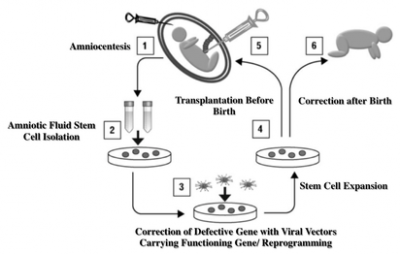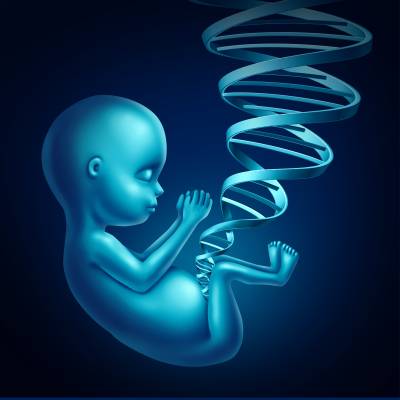Overview: Inherited genetic disorders are important causes of morbidity and mortality. Prenatal diagnosis is now possible early in pregnancy using the maternal blood. Postnatal stem cell transplantation is limited by the immune response to the cells. Stem cells in the amniotic fluid (AF) cells may be a good cell source for prenatal therapy. Some of these AF stem cells have hematopoietic activity meaning they may be used to treat inherited blood disorders such as thalassaemia or sickle cell anaemia. We are studying how to use AF stem cells to correct inherited anaemias before birth.
Design:

Team: Durrgah L Ramachandra, Stavros P Loukogeorgakis, Eleni Antoniadou,
Funding: Wellcome Trust, Sparks, Rosetrees Trust
Links: Wellcome Trust, Sparks, Rosetrees Trust, UK Thalassaemia Society
In utero Gene Therapy (IUGT) for Congenital Blood Disorders
Beta thalassaemia is a genetic blood disease that causes life-threatening anemia. Hematopoietic stem cell (HSC) transplantation successfully cures the disease but in only 30% of patients.
In humans, successes with in utero transplantation using allogeneic haematopoietic stem cells, has been limited to fetuses with severe immunologic defects where there is an effective lack of immune response to allogeneic cells.
We hypothesized that IUGT to the fetal HSC compartment (Liver) using a vector carrying the corrected beta globin gene (GLOBE, Dr Mike Antoniou Kings College London) might cure the disease before birth.
Ideally, having a diagnosis using Non Invasive Prenatal Diagnosis (NIPD) at 10 weeks of gestation will give enough time to administer IUGT and correct the disease before birth.

Team: Simon Waddington, Joe Davidson
Funding: MRC
 Close
Close

